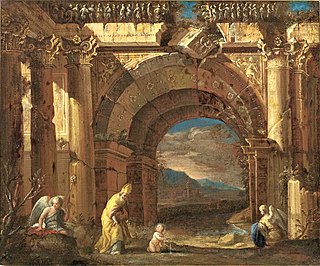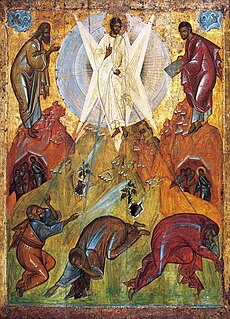
Apophatic theology, also known as negative theology, is a form of theological thinking and religious practice which attempts to approach God, the Divine, by negation, to speak only in terms of what may not be said about the perfect goodness that is God. It forms a pair together with cataphatic theology, which approaches God or the Divine by affirmations or positive statements about what God is.
The analogy of the sun is found in the sixth book of The Republic (507b–509c), written by the Greek philosopher Plato as a dialogue between Glaucon and Socrates. Upon being urged by Glaucon to define goodness, a cautious Socrates professes himself incapable of doing so. Instead he draws an analogy and offers to talk about "the child of goodness". Socrates reveals this "child of goodness" to be the sun, proposing that just as the sun illuminates, bestowing the ability to see and be seen by the eye, with its light so the idea of goodness illumines the intelligible with truth. While the analogy sets forth both epistemological and ontological theories, it is debated whether these are most authentic to the teaching of Socrates or its later interpretations by Plato.

Abū Ḥamīd bin Abū Bakr Ibrāhīm, better known by his pen-names Farīd ud-Dīn and ʿAṭṭār of Nishapur, was a Persian poet, theoretician of Sufism, and hagiographer from Nishapur who had an immense and lasting influence on Persian poetry and Sufism. He wrote a collection of lyrical poems and number of long poems in the philosophical tradition of Islamic mysticism, as well as a prose work with biographies and sayings of famous Muslim mystics. Manṭiq-uṭ-Ṭayr and Ilāhī-Nāma and Memorial of the Saints are among his best known works.

The Symposium is a philosophical text by Plato dated c. 385–370 BC. It depicts a friendly contest of extemporaneous speeches given by a group of notable men attending a banquet. The men include the philosopher Socrates, the general and political figure Alcibiades, and the comic playwright Aristophanes. The speeches are to be given in praise of Eros, the god of love and desire.

In philosophy, Plato's epistemology is a theory of knowledge developed by the Greek philosopher Plato and his followers.
"Form of the Good", or more literally "the idea of the good" is a concept in the philosophy of Plato. The definition of the Good is a perfect, eternal, and changeless Form, existing outside space and time.

Eros is a concept in ancient Greek philosophy referring to sensual or passionate love, from which the term erotic is derived. Eros has also been used in philosophy and psychology in a much wider sense, almost as an equivalent to "life energy". Protestant author C. S. Lewis posits it as one of the four ancient Greek words for love in Christianity, alongside storge, philia, and agape.
The Phaedrus, written by Plato, is a dialogue between Plato's protagonist, Socrates, and Phaedrus, an interlocutor in several dialogues. The Phaedrus was presumably composed around 370 BCE, about the same time as Plato's Republic and Symposium. Although ostensibly about the topic of love, the discussion in the dialogue revolves around the art of rhetoric and how it should be practiced, and dwells on subjects as diverse as metempsychosis and erotic love.
Phædo or Phaedo, also known to ancient readers as On The Soul, is one of the best-known dialogues of Plato's middle period, along with the Republic and the Symposium. The philosophical subject of the dialogue is the immortality of the soul. It is set in the last hours prior to the death of Socrates, and is Plato's fourth and last dialogue to detail the philosopher's final days, following Euthyphro, Apology, and Crito.

In a religious context, the practice of contemplation seeks a direct awareness of the divine which transcends the intellect, often in concert with prayer or meditation.

Platonism is the philosophy of Plato and philosophical systems closely derived from it, though contemporary platonists do not necessarily accept all of the doctrines of Plato. Platonism had a profound effect on Western thought. Platonism at least affirms the existence of abstract objects, which are asserted to exist in a third realm distinct from both the sensible external world and from the internal world of consciousness, and is the opposite of nominalism. This can apply to properties, types, propositions, meanings, numbers, sets, truth values, and so on. Philosophers who affirm the existence of abstract objects are sometimes called platonists; those who deny their existence are sometimes called nominalists. The terms "platonism" and "nominalism" also have established senses in the history of philosophy. They denote positions that have little to do with the modern notion of an abstract object.
This is a history of aesthetics.
Hippias Major is one of the dialogues of Plato, although its authenticity has been doubted. It belongs to the early dialogues, written while the author was still young. Its precise date is uncertain, although a date of c. 390 BC has been suggested.

Mystical theology is the branch of theology that explains mystical practices and states, as induced by contemplative practices such as contemplative prayer.
The Argument from Beauty is an argument for the existence of a realm of immaterial ideas or, most commonly, for the existence of God.

Kashf "unveiling" is a Sufi concept dealing with knowledge of the heart rather than of the intellect. Kashf describes the state of experiencing a personal divine revelation after ascending through spiritual struggles, and uncovering the heart in order to allow divine truths to pour into it. Kashf is etymologically related to mukashafa “disclosure”/ “divine irradiation of the essence”, which connotes "gain[ing] familiarity with things unseen behind the veils". For those who have purified their hearts, and who come to know the Divine Names and Attributes to the fullest of their individual capacities, the veils in front of the purely spiritual realms are opened slightly, and they begin to gain familiarity with the unseen. In Sufism, an even further revelatory capacity exists by which the Divine mysteries become readily apparent to the seeker through the light of knowledge of God. This is called tajalli "manifestation".

Ṣadr al-Dīn Muḥammad b. Isḥāq b. Muḥammad b. Yūnus Qūnawī [alternatively, Qūnavī, Qūnyawī],, 1207-1274 CE/605-673 AH), was a Persian philosopher, and one of the most influential thinkers in mystical or Sufi philosophy. He played a pivotal role in the study of knowledge—or epistemology, which in his context referred specifically to the theoretical elaboration of mystical/intellectual insight. He combined a highly original mystic-thinker, Muḥyī al-Dīn Ibn 'Arabī, whose arcane teachings Qūnavī codified and helped incorporate into the burgeoning pre-Ottoman intellectual tradition, on the one hand, with the logical/philosophical innovations of Ibn Sīnā, on the other. Though relatively unfamiliar to Westerners, the spiritual and systematic character of Qūnawī's approach to reasoning, in the broadest sense of the term, have found fertile soil in modern-day Turkey, North Africa and Iran not to mention India, China, the Balkans and elsewhere over the centuries.
The theory of Forms or theory of Ideas is a philosophical theory, concept, or world-view, attributed to Plato, that the physical world is not as real or true as timeless, absolute, unchangeable ideas. According to this theory, ideas in this sense, often capitalized and translated as "Ideas" or "Forms", are the non-physical essences of all things, of which objects and matter in the physical world are merely imitations. Plato speaks of these entities only through the characters of his dialogues who sometimes suggests that these Forms are the only objects of study that can provide knowledge. The theory itself is contested from within Plato's dialogues, and it is a general point of controversy in philosophy. Nonetheless, the theory is considered to be a classical solution to the problem of universals.

Christian contemplation, from contemplatio, refers to several Christian practices which aim at "looking at", "gazing at", "being aware of" God or the Divine. It includes several practices and theological concepts, and until the sixth century the practice of what is now called mysticism was referred to by the term contemplatio, c.q. theoria.
Diotima's Ladder of Love, also known as Plato’s ladder of love or Plato’s ladder of Eros is a philosophy of different types of love that originated in Plato's Symposium. Socrates had a speech contest of praising Eros, the god of love. In the end, they summarized the ideas based on the teachings of a priestess, Diotima. There are six types of love, and each kind is put on a rung of a ladder. The ladder represents the path of love as an ascent from, initially, pure physical attraction to, finally, love of divinity.









